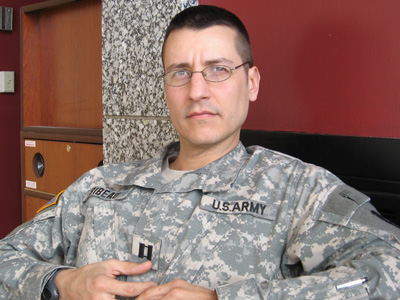
Jeff Bibeau is the kind of guy who can make you want to be 14 again, just so you can sit in his history class. Just ask the kids at Roseville Area Middle School who earlier this week lost one of their favorite teachers to the Minnesota National Guard and a coming deployment to Iraq.
Bibeau, a captain in the Guard, said when he first received word last month that he was being called to active duty, he couldn’t talk about the possibility of leaving his classes. “I told the people who needed to know… and then I decided I didn’t want to tell the students until I needed to. And so last Friday, just the weekend before I was leaving, I made the announcement and I let them ask me any questions they wanted to because by that time I had some time to collect myself, get myself together; it was very hard.”
It was hard for the students, too. They went home last weekend and told their parents. On Monday — Captain Bibeau’s last day — there were cards, letters, and brownies sent to school from grateful parents on behalf of disappointed kids.
“Mr Bibeau taught me to be skeptical, and as weird as that may sound, it’s important if you ever want to learn about what’s beneath the surface,” eighth grader Dan Hartmann said in an e-mail. “He told us about himself. I think my favorite part of the whole class is seeing how easy it can be to get someone to pay attention to you. History is the only class in which the teacher doesn’t have to shut the kids up by telling them to be quiet. When Mr. Bibeau talks, people listen.”
By just about any standards, Bibeau, 39, is a natural teacher, who can credit the military — he was in the Navy for years — with putting him in a classroom. “When I was in the Navy, we had this professor from the University of Texas and he lived on the ship for three years teaching classes. And he said, ‘absolutely, you need to be a history teacher.’ And so from that point on I couldn’t wait to get out of the Navy and go back to college and finish my teaching degree.”
He said he always felt as if history could be taught better than when he was in school, that his students could appreciate it more.
“Just to see the transformation and how they get into it and you can show them how if you take what’s going on today, you can give them numerous examples from the past. The only difference is the people involved and the place it occurs. And when they make that connection, it’s just awesome!
“I can remember I got a letter one time when I was deployed to Bosnia and a student said ‘I just wanted to thank you. I just got accepted to college and I’m going to become a history teacher,'” he said Wednesday.
Before he left class on Monday, he had one more lesson for the kids about the adult world.
“Time heals,” he told them. “By this time next year you’ll be focused on what you’re doing as ninth graders. It’s like at the end of the school year when you all go off your own way, you’re moving on to better things and if that happens and the e-mails dry up, I expect that to happen.”
And he had one more lesson for adults, about the world of 8th graders.
“They’re just normal people and I think unless you get to know them, you think they’re troublemakers, you think they’re hooligans, you think they’re all these things that they’re not . People always say ‘you teach 8th grade? I feel sorry for you.’ Why? Have you ever done it? It’s awesome. Some of them say they spend more time each day talking to me than they do with their parents, because everyone is working and doing these other things that they do. So, I think it’s important for a teacher to be involved and communicate with kids and make contact with them. It’s pretty neat.”
Audio excerpts (all mp3)
(This story originated from this earlier post on News Cut. We all know people making a difference. What’s your story?)
